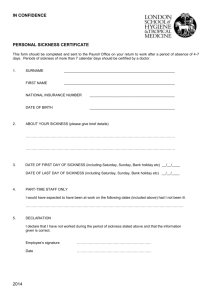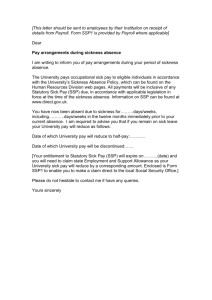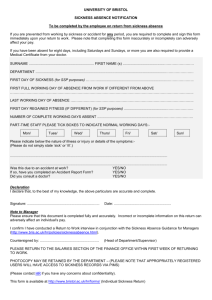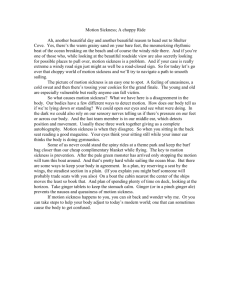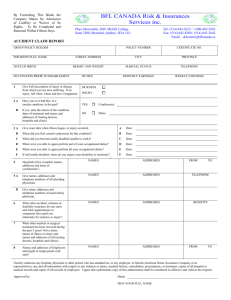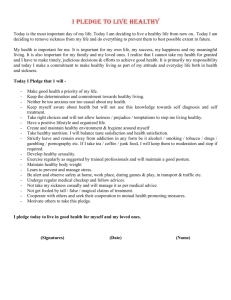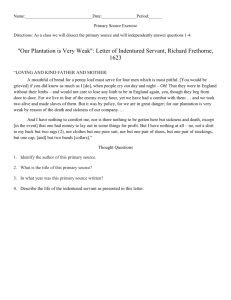Sickness Absence Procedure - Queen's University Belfast
advertisement
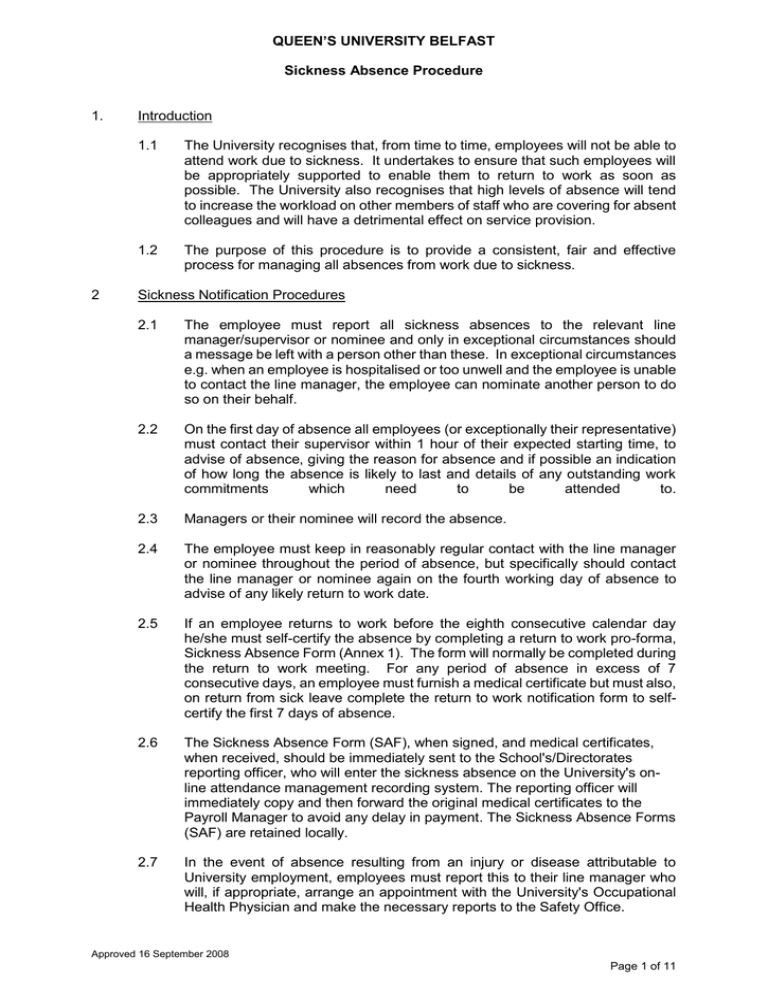
QUEEN’S UNIVERSITY BELFAST Sickness Absence Procedure 1. 2 Introduction 1.1 The University recognises that, from time to time, employees will not be able to attend work due to sickness. It undertakes to ensure that such employees will be appropriately supported to enable them to return to work as soon as possible. The University also recognises that high levels of absence will tend to increase the workload on other members of staff who are covering for absent colleagues and will have a detrimental effect on service provision. 1.2 The purpose of this procedure is to provide a consistent, fair and effective process for managing all absences from work due to sickness. Sickness Notification Procedures 2.1 The employee must report all sickness absences to the relevant line manager/supervisor or nominee and only in exceptional circumstances should a message be left with a person other than these. In exceptional circumstances e.g. when an employee is hospitalised or too unwell and the employee is unable to contact the line manager, the employee can nominate another person to do so on their behalf. 2.2 On the first day of absence all employees (or exceptionally their representative) must contact their supervisor within 1 hour of their expected starting time, to advise of absence, giving the reason for absence and if possible an indication of how long the absence is likely to last and details of any outstanding work commitments which need to be attended to. 2.3 Managers or their nominee will record the absence. 2.4 The employee must keep in reasonably regular contact with the line manager or nominee throughout the period of absence, but specifically should contact the line manager or nominee again on the fourth working day of absence to advise of any likely return to work date. 2.5 If an employee returns to work before the eighth consecutive calendar day he/she must self-certify the absence by completing a return to work pro-forma, Sickness Absence Form (Annex 1). The form will normally be completed during the return to work meeting. For any period of absence in excess of 7 consecutive days, an employee must furnish a medical certificate but must also, on return from sick leave complete the return to work notification form to selfcertify the first 7 days of absence. 2.6 The Sickness Absence Form (SAF), when signed, and medical certificates, when received, should be immediately sent to the School's/Directorates reporting officer, who will enter the sickness absence on the University's online attendance management recording system. The reporting officer will immediately copy and then forward the original medical certificates to the Payroll Manager to avoid any delay in payment. The Sickness Absence Forms (SAF) are retained locally. 2.7 In the event of absence resulting from an injury or disease attributable to University employment, employees must report this to their line manager who will, if appropriate, arrange an appointment with the University's Occupational Health Physician and make the necessary reports to the Safety Office. Approved 16 September 2008 Page 1 of 11 3. 2.8 Where an employee has been absent in excess of 6 weeks, they must give reasonable notice of their expected return to work date. This will normally be 2 weeks’ notice prior to the date of return. 2.9 In normal circumstances an employee cannot commence a period of holiday leave immediately following a period of sickness absence unless previously booked. 2.10 If an employee is sick during a period of holiday leave, they will be regarded as being on sick leave from the date specified on any medical certificate. They may take the balance of their leave at a later date, on return to work, in accordance with the Accrual and Carry Over of Holidays and Other Leave (http://www.qub.ac.uk/pers/policies.htm). Sickness Absence – General Principles 3.1 The University undertakes to ensure that as far as it is reasonably practicable to do so, it will endeavour to minimise absences by: - - Ensuring that workplace Health and Safety standards are maintained; Ensuring that, should business needs allow, individual needs arising from medical opinion (e.g. part-time, flexible working, temporarily or permanently adjusted duties or redeployment) may be accommodated - in full or part in line with the University’s Work Life Balance Procedures. Providing all employees with appropriate training and guidance particularly during probationary periods; 3.2 Employees are expected to attend for work regularly at the times required and, as far as is reasonably practicable, to minimise absence from work and to keep in reasonable contact with the University throughout any period of sickness absence. 3.3 This policy will operate within the requirements of the Disability Discrimination Act 1995. Where an employee has a disability, any reasonable adjustment to accommodate this person e.g. adjustments to premises, alteration of working hours, acquiring modified equipment, provision of training, will be made to ensure regular attendance at work. 3.4 Absence from work due to illness is not treated as misconduct unless there is evidence to show that there is no underlying medical condition which has resulted in the absences. If at any stage of the following procedure, the University suspects that the employee's reasons for failing to attend work are false, then the matter will be referred for investigation using the appropriate disciplinary procedure. 3.5 If an employee's attendance pattern is such that it can be reasonably assumed that there is deliberate abuse or manipulation of the University's absence procedure or sickness payment entitlements then that matter may also be treated as misconduct and investigated appropriately. For example: - a pattern of sickness absence that maximises pay or enhancement entitlements; a regular pattern of absence immediately following public or recognised holidays or weekends; a pattern of absence that coincides with certain events; a pattern of absence that is designed to frustrate the University's threshold levels/warning systems (see section 4 below). Approved 16 September 2008 Page 2 of 11 3.6 If the reason for absence is work-related, then consideration should be given to an immediate meeting between the line manager and member of staff, or if more appropriate, an immediate referral to the Occupational Health Physician, depending upon the nature of the illness or injury (e.g. work related stress or injury/accident at work). Where the absence is as a consequence of an accident at work, the employee should ensure that their management is informed of the accident as soon as possible, even if they remain off work. 4. 3.7 If an employee states, or a manager has reasonable grounds to suspect, that sickness absence is attributable to reasons which are not wholly medical, then the employee will be referred for appropriate counselling or support or to the appropriate University procedures e.g. Drug and Alcohol Counselling, Family Friendly Policies, Grievance procedure etc. 3.8 Medical certificates and information on the medical reasons for absence should be treated in a confidential manner. Such records should be stored and accessible only to those designated reporting officers and the relevant line managers. 3.9 The employee has the right to be represented by their trade union representative or University colleague throughout the application of the formal procedure from stage 2 onwards. Sickness Absence Procedure It is essential that all sickness absence is notified in accordance with section 2 and is reported, in a timely manner, by the staff member in accordance with the procedure below and recorded by the Line Manager (or nominee) for monitoring purposes. 4.1 Short-Term Absences (First Stage) Short-term absences are defined as those which cumulatively last for less than 20 working days within a rolling 12 month period. In considering an employee’s record of absence, account will be taken of the reason and pattern as well as the total amount of sickness absence. It is critical that managers monitor attendance on a regular basis (at least monthly) and undertake a return to work meeting/interview after each period of absence and complete the pro-forma (Annex 1). The manager shall review absence levels on a more formal basis when, in any 12 month rolling period, a threshold index of 45 is exceeded. Example 1 5 days + 5 days + 5 days = 15 days x 3 occasions of absence = 45 (on threshold) Example 2 1 day + 1 day + 1 day + 1 day + 1 day + 1 day + 1 day = 7 days x 7 occasions of absence = 49 ( above threshold of 45) Example 3 3 days + 2 days + 3 days = 8 days x 3 occasions = 24 (below threshold of 45) In such circumstances the line manager will meet with the employee (a first stage meeting) as soon as possible on his/her return to work in the context of encouraging the employee to outline the reasons for absence, and medical help Approved 16 September 2008 Page 3 of 11 being provided and identify if the University can assist in any way. The purpose of this meeting is to encourage the staff member to improve their attendance where there is no evidence of an underlying medical condition. The employee will be advised of the possibility of referral to the Occupational Health Physician. Following this meeting the pro-forma (Annex 2) must be completed and lodged with the Personnel Department. This will list the main points covered and will also provide details of any assistance offered and any period over which a reasonable improvement may be expected. The employee’s attendance record will be kept under review. 4.2 Persistent Short-Term Absences (Second Stage) Normally, following the First Stage meeting, absences totalling 7 working days or more, in the next 12 month period will be defined as persistent short-term absence. Where such absences occur the line manager will meet the employee in a formal interview. The employee is entitled to have a trade union representative or work colleague in attendance. Again this interview should be held in the context of a welfare and supportive discussion, and at this stage the employee will normally be referred to the Occupational Health Physician. It may also be necessary to request a medical report from the employee’s GP and/or specialist. From the Second Stage (Persistent short-term absences) of this procedure employees will be afforded the right to be accompanied by a work colleague or trade union representative and the line manager may be accompanied by another member of management. 4.3 Non-Improvement/Final Review If, after a further period, and having regard to the nature of the illness, there is still cause for concern in that the employee’s attendance record does not show a sustained improvement, the line manager, together with a Personnel representative, should meet with the employee and their trade union representative or work colleague. At this stage a further report should be obtained from the Occupational Health Physician. Following receipt of the Occupational Health Physician’s report the following options will be considered taking into account the views of the Occupational Health Physician: (i) If the sickness absences are due to an underlying medical condition consideration will be given for the termination of employment on the grounds of the employee’s inability to properly discharge his/her duties due to medical incapacity having regard to the medical information available. (ii) If the absences are not for an underlying medical condition, this will be regarded as the inability to provide a regular and sustained attendance at work and may result in dismissal. For those staff covered by the University Statutes, the Incapacity on Health Grounds Regulation will apply. This Regulation at paragraph 3 refers to the agreed sickness absence procedure being applied and consideration by the Absence Review Panel. This Panel will be constituted on the same basis as that set out below. Approved 16 September 2008 Page 4 of 11 For staff not covered by the University Statute an Absence Review Panel will be constituted to consider the termination of the staff member's employment. This Panel will comprise: - - Director/Pro-Vice-Chancellor for the area unless previously involved in the case, in such circumstances a Director/Pro-Vice-Chancellor from a different area will be nominated; Line Manager/Head of School, not previously involved in the case; Personnel representative, not previously involved in the case. The Absence Review Panel will consider all the relevant evidence including relevant medical reports and meet with the employee and their trade union representative or University colleague and determine whether dismissal is appropriate. A decision to terminate employment on grounds of medical incapacity does not automatically qualify an employee for release of pension entitlements where the employee is a member of an occupational health scheme. Applications for employees to retire on grounds of permanent ill-health or infirmity require the separate approval of the trustees of USS/RBP. The University cannot enter into any prior commitment to allow an employee to retire early on ill-health grounds. Termination of employment on the above grounds constitutes a dismissal. In such cases the employee will be entitled to notice (contractual or statutory whichever is greater) of termination of his/her employment. 4.4 Appeals If a member of staff (Statute) wishes to appeal the decision to terminate his/her employment, then he/she should do so in accordance with the Appeals Process of the Regulations covering incapacity on Health Grounds (www.qub.ac.uk/pers/policies/policies). If the member of staff (non-Statute) wishes to appeal against the decision of the Absence Review Panel, he or she, may do so by writing to the Director of Human Resources within ten working days of the date of notification of the Panel’s decision, setting out in full the grounds for appeal. A late appeal may be considered if the Director of Human Resources considers there to be good reason for the delay. On receipt of an appeal the Director of Human Resources will establish and convene an appropriately constituted Appeal Panel. The Appeal Panel shall comprise: (i) (ii) (iii) Director/Pro-Vice-Chancellor (not previously involved in the case) Line Manager/Head of School (not previously involved in the case) Personnel Representative (not previously involved in the case) Where the grounds of the appeal are not clear the Panel may ask for written clarification. The Director of Human Resources office will make arrangements for an appeal hearing. The member of staff will be notified in writing of the date of the appeal hearing, with at least 5 working days notice being given. The member of staff will also be notified of their right to be represented or assisted by a representative of a recognised trade union or University colleague. The hearing of the appeal should normally take place within 20 working days of the receipt of the appeal by the Director of Human Resources. In exceptional circumstances or by mutual agreement, this period may be extended. Approved 16 September 2008 Page 5 of 11 The decision of the Appeal Panel shall be final. 5. Long Term Sickness 5.1 Long Term Absences The circumstances that give rise to an absence of this type are usually quite different to those causing short-term absence. This is defined as illness or injury which is likely to result in an absence from work of at least 4 weeks (20 working days) or which could result in an employee being unable to return to work. Any employee who has been absent on certified sick leave for more than 4 weeks continuously should be contacted by his/her line manager to ascertain his/her progress and to determine whether there is any practical assistance which can be given. This should be done in the context of genuine welfare assistance and there should not be any sense of intrusion into private matters or pressure concerning the employee’s return to work. Home and hospital visits will only take place by agreement with the employee and will be at a mutually convenient time. The employee can alternatively agree arrangements to meet at a suitable alternative venue. If the sickness lasts, or is expected to last, for 6 weeks or more, it may be necessary to arrange a medical examination through referral to the Occupational Health Physician. It may also be necessary to request a medical report from the employee’s GP or the Occupational Health Physician with the consent of the employee. Following the medical examination, the Line Manager, or nominee, will consider what subsequent action is necessary, based on the medical report(s) and the totality of the absence record. This may include progression in stages (First Stage, Second Stage and Non-Improvement/Final Review) as previously outlined under Short-Term Absences. 5.2 Return to Work For those returning to work after long-term sickness absence a return to work interview will be held between the employee and his/her line manager. This interview will be recorded using Annex 2 and will be used to welcome the employee back to work. The interview should cover any changes within the employee’s work area since his/her absence commenced. If any problems of a major nature are perceived (eg employee not fully fit) this should be recorded as above and the University may require attendance for medical assessment. A phased return to work may be considered to allow the employee a period of rehabilitation into the workplace. This will be agreed on full or pro-rata payment and advised to the employee. 5.3 Incomplete Recovery If the employee is unlikely to recover sufficiently to enable a return to all of his/her previous duties, the possibility of finding alternative or a reduced level of work must be considered. All reasonable steps should be taken to identify a job that the employee is able to do – where appropriate with the benefit of training and/or the making of suitable workplace adjustments (see Disability Discrimination Act 1995). Approved 16 September 2008 Page 6 of 11 5.4 No Prospect of Recovery On occasions the medical assessment might indicate that the employee will not be able to return in the foreseeable future to his/her job. In such circumstances, termination of employment on the grounds of the inability of the employee to properly discharge his/her duties due to ill health must be considered. The process and panels to deal with consideration of termination of employment in these circumstances are those as outlined in paragraphs 4.3 and 4.4. In considering time scales, the nature of the position held by the employee, the necessity of replacing him/her and the feasibility of providing temporary cover are valid factors. Before any decision to terminate employment is put into effect the following options will be considered: (i) (ii) (iii) 5.5 redeployment to a different job; reduction in hours; or use of appropriate adjustments (see Disability Discrimination Act 1995). Terminal Illness In cases where medical assessment indicates that the employee is suffering from a terminal illness, it would be inappropriate to embark on formal procedures. In such circumstances it is essential for the relevant line manager to maintain appropriate contact with the employee and/or their family. To enable the most appropriate pension arrangements to be made line managers are requested to inform the Pensions Office at the earliest possible date of any employees known to be suffering from a terminal illness. 5.6 Request by an Employee to be Considered for Retirement on Grounds of Permanent Ill Health Where an employee makes a written request to the University to be considered for retirement on grounds of ill-health the University will arrange for the employee to be examined by the Occupational Health Physician and will give the Occupational Health Physician any medical evidence submitted by the employee in support of the request. The ill-health retirement can only be granted if the trustees of USS/RBP approve the application. The application will only be approved if the trustees are satisfied that the employee meets the ill-health criteria of the scheme. The trustees will require a medical report from an independent doctor to enable them to assess the fitness of the employee to attend work. The employee will be asked to sign a consent form to enable the trustees to obtain this report. If additional medical information is required the employee will be contacted by the pension scheme. If an application is declined the pension schemes have formal appeals procedures which can be followed. If an application and any subsequent appeal are denied the University will then consider the termination of employment on grounds of medical incapacity. 6. Referral to Occupational Health Physician Approved 16 September 2008 Page 7 of 11 An employee shall, if required by the University at any time, submit to a medical examination by the University’s Occupational Health Physician subject to the provisions of the access to Medical Reports Act 1991 where applicable. Any costs associated with the examination shall be met by the University. Failure to attend the examination without reasonable explanation may result in the withholding of sick pay. 7. Conduct During Sick Absence The following guidelines should be observed concerning conduct and activities during any periods of absence due to sickness or injury. In all cases of sickness, which necessitate taking time off work, employees are expected to do their utmost to facilitate a speedy return to work. The University would not under normal circumstances expect employees to engage in any activity, which is inconsistent with the nature of their condition. The type of behaviour expected will depend on individual circumstances and the nature of the condition. Should an employee be in any doubt regarding the appropriateness of his/her behaviour whilst absent due to sickness he/she should consult his/her line manager. If the University can substantiate that an employee is undertaking activities inconsistent with the nature of their condition, whilst on sick leave, the University may feel that it is necessary to invoke the relevant disciplinary procedure. 8. University Sick Pay Entitlements 8.1 Any employee absent from duty owing to illness shall be entitled to payment in accordance with the following scale: Full Pay Half Pay During the first 3 months of service 2 weeks 2 weeks During the remaining 9 months of the 1st year of service 2 months 2 months 2nd and 3rd year of service 3 months 3 months 4th and 5th year of service 5 months 5 months after 5th year of service 6 months 6 months 8.2 The rate of allowance and the period for which it shall be paid will be calculated by deducting the aggregate of the periods of absence (either paid or unpaid) due to illness during the twelve months prior to the first day of absence, from the above entitlements. 8.3 If an employee is required by the University to be absent from duty for any Health and Safety reason eg maternity related reasons, contact with an infectious disease etc, the employee is entitled to receive full pay for the period indicated by the Occupational Health Physician. 8.4 Where an employee is absent as a result of an accident where a third party is held to be liable, then the above scale of allowances will be paid pending any settlement of the claim against the third party. The employee must, however, claim loss of earnings from that third party, equal to any sickness payments paid under the above scale of allowances and repay from loss of earnings damages, the sickness payments made by the University. Approved 16 September 2008 Page 8 of 11 10. 8.5 An employee whose absence on account of sickness or injury is due or attributable to his own misconduct, eg failure to adhere to a reasonable instruction is not entitled to a University sick allowance except at the discretion of the University 8.6 In an exceptional case, the Director of Human Resources shall have the discretion to extend the period of sick leave on half pay beyond the period of the employee's entitlement. 9. Suspension on Medical Grounds 9.1 A manager may, in exceptional circumstances and in consultation with the Personnel Manager, suspend an employee on medical grounds without prejudice. Such a situation may arise if an employee returns to work after a period of sickness absence and the manager has reasonable doubts about the employees ability to safely perform the full range of duties (or the range of duties agreed by the Occupational Health Physician prior to return to work). During such a suspension, the employee is entitled to receive their normal rate of pay. 9.2 If it is absolutely impracticable for the line manager to consult the Personnel Manager in advance, then the suspension should be reported to the Personnel Manager as soon as is reasonably practicable. Unauthorised Absence See Code of Conduct Approved 16 September 2008 Page 9 of 11 STRICTLY CONFIDENTIAL ANNEX 1 QUEEN’S UNIVERSITY BELFAST SICKNESS ABSENCE FORM (SAF) PART 1 - To be completed by line manager on notification of sickness absence for a member of staff absent from work for a half day or more DETAILS OF EMPLOYEE Surname: Forename: Section/Department/School: First day of sickness: Staff No. (day) (date) (day) (date) Half Day Sickness? YES/NO Estimated Return Date: Reason for Absence: DETAILS OF LINE M ANAGER OR NOMINEE Name: Signed: Date: Time: DETAILS OF MONITORING OFFICER Online Record Updated? Name: Signed: Yes/No PLEASE FORWARD COPY TO MONITORING OFFICER FOR ENTRY TO ONLINE RECORD PART 2 - To be completed by line manager and employee at return to work meeting following sickness absence Last day of sickness (DAY) (DATE) Total no. of working days absent: Half Day Sickness? YES/NO Working Days Did you receive medical treatment from your GP or other medical professional during your absence? YES/NO If yes, please state where and when: YES/NO Is your injury/illness work related? If yes, please provide details: DETAILS OF MONITORING OFFICER Name: Online Record Updated? Yes/No Signed: DECLARATION I declare that I have not worked during the period of sickness and that the above statement is true and accurate to the best of my knowledge. I understand that to give false or misleading information can result in suspension of occupational sick pay, disciplinary proceedings that may lead to dismissal Signature (Employee) ………………………………………….. Date: …………………….... Signature (Line Manager) ………………………………………….. Date: ……………………… PLEASE FORWARD TO THE MONITORING OFFICER FOR ENTRY TO ONLINE RECORD AND FILING. 02/12/2015 Approved 16 September 2008 Page 10 of 11 ANNEX 2 QUEENS UNIVERSITY BELFAST ACTION TAKEN FORM (ATF) This form should be completed at any meeting which may result in management action under the Sickness Absence Procedure. Normally this will be: Once a threshold has been reached: The form will confirm that a meeting has taken place; a member of staff has been informed of their absence record; welfare issues have been discussed where necessary; and will record any action to follow in light of the particular circumstances. On return from long absence: The form will outline issues discussed in relation to return to work and detail as far as possible the nature and expected duration of any transitional arrangements. Following Review: The form will outline the issues discussed and will detail decisions made in respect of managements action including referral to disciplinary and capability procedures. When referral is made to Personnel, or Personnel is involved in action being taken a copy of the ATF should be forwarded to the Personnel Office. SECTION 1 EMPLOYEE INFORMATION NAME: STAFF NO: DEPARTMENT: SECTION 2 ACTION TAKEN DATE OF MEETING: REASON FOR MEETING: THRESHOLD LONG TERM RETURN REVIEW OTHER …………………………………. SUMMARY OF DISCUSSION: IS MEDICAL EVIDENCE/FURTHER MEDICAL EVIDENCE REQUIRED? ACTION TO BE TAKEN: YES/NO NO FURTHER ACTION MONITORING, FOLLOW UP MEETING REFERRAL TO PERSONNEL REFERRAL TO OCCUPATIONAL HEALTH (VIA PERSONNEL) OTHER ………………………….. EMPLOYEE SIGNATURE: ………………………………………… DATE: …………………… LINE MANAGER SIGNATURE: ………………………………………… DATE: …………………… 16 SEPTEMBER 2008 Approved 16 September 2008 Page 11 of 11
